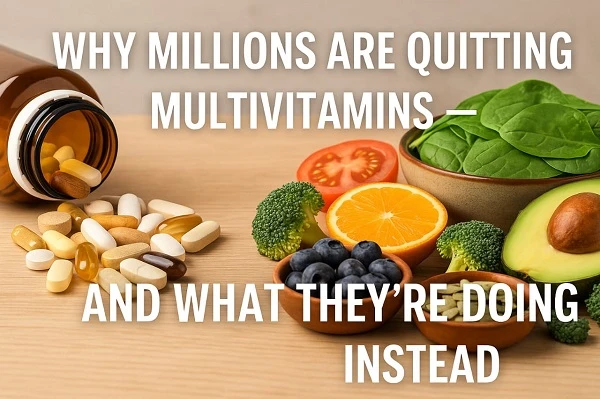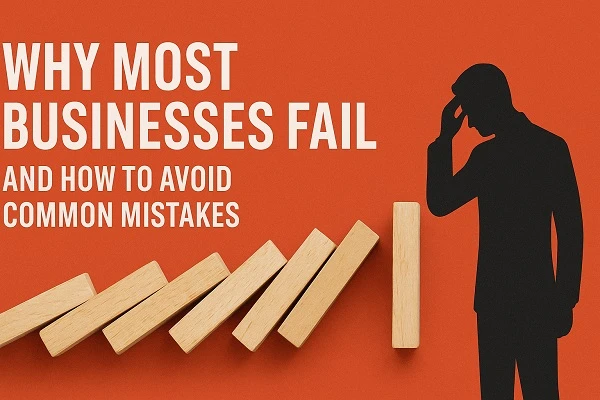Last Updated: July 2, 2025
Why Millions Are Quitting Multivitamins — And What They're Doing Instead

For decades, multivitamins were considered a health staple. One pill a day promised to make up for dietary gaps, energize the body, and even prevent chronic disease. But times are changing — and fast. Millions of people are now abandoning these once-beloved supplements. Why? The answer lies in a combination of groundbreaking research, safety concerns, and a shift toward more natural approaches to nutrition.
Are Multivitamins Really Worth It?
Multivitamins have become a $30+ billion industry worldwide. But scientific scrutiny is putting the brakes on their hype. Large-scale studies are raising serious doubts about their benefits — and revealing hidden dangers.
Major Studies Question Their Effectiveness
- A 2022 meta-analysis published in JAMA found no clear evidence that daily multivitamins reduce the risk of cancer, heart disease, or mortality.
- Researchers from Johns Hopkins University concluded in a landmark study: “Stop wasting money on vitamin and mineral supplements.”
- Other studies show that certain vitamins, when consumed in excess (especially in pill form), may even be harmful to health.
Hidden Risks You May Not Know About
Besides their limited benefits, multivitamins may also pose unexpected risks:
- Overdosing: Some vitamins (like A, D, E, and K) are fat-soluble and can accumulate in your body to toxic levels.
- Interaction with medications: Multivitamins may interfere with prescription drugs like blood thinners or statins.
- Low-quality ingredients: Many supplements are made with synthetic additives, binders, and fillers.
- Lack of regulation: Unlike prescription drugs, supplements are not tightly regulated by the FDA or global equivalents.
So What’s the Alternative?
The movement away from multivitamins isn't about abandoning health — it’s about pursuing it in a smarter, more natural way. Enter: whole foods.
Why Whole Foods Work Better
- Whole foods provide nutrients in their most bioavailable forms.
- They include fiber, enzymes, and co-factors that help the body absorb and utilize vitamins efficiently.
- Natural compounds in food — like polyphenols and antioxidants — offer added protective benefits.
For example, eating a spinach salad gives you vitamin C, iron, magnesium, fiber, and a host of other nutrients in a balanced form. A pill? Not even close.
Popular Food-Based Alternatives
- Green smoothies: A blend of kale, spinach, and fruits delivers micronutrients with fiber.
- Fermented foods: Yogurt, kefir, and kimchi boost gut health, which in turn improves nutrient absorption.
- Superfood blends: Spirulina, moringa, and maca are gaining popularity as powdered add-ons for nutrition.
What People Are Doing Instead
Consumers are now moving toward personalized health plans that emphasize:
- Eating the rainbow — a diet rich in colorful fruits and veggies
- Mindful grocery shopping for clean, organic produce
- Limiting processed foods and chemical additives
- Consulting functional medicine practitioners over generic supplement advice
The Role of Technology
Another big reason for this shift? Wearables and at-home blood tests. These tools help people track deficiencies accurately and avoid “one-size-fits-all” supplements.
Example:
Instead of guessing, a user can now test for vitamin D levels at home and then take only what’s needed — not a blanket multivitamin packed with 30+ ingredients.
Big Brands Are Taking Note
Even major supplement companies are pivoting. Brands like Ritual and Care/of now offer personalized vitamins based on lifestyle quizzes or lab tests. Others are focusing on food-based capsules made from dehydrated fruits and vegetables.
Myth-Busting: But What If I Have a Deficiency?
Genuine deficiencies — like low B12 or iron — do exist. But they’re better treated through targeted supplementation under medical supervision, not generic multivitamins.
And guess what? These deficiencies often stem from poor diets or gut health issues — both of which whole foods can help fix over time.
Real-Life Example
Meet Sarah, a 38-year-old teacher who used to take multivitamins daily. After working with a nutritionist, she switched to a diet rich in nuts, seeds, leafy greens, and omega-3 sources. Within 6 months, her energy levels soared — and her lab reports confirmed the shift. “I feel more in control now,” she says, “and I’m not popping random pills anymore.”
Final Thoughts: Pills or Plants?
Multivitamins aren’t evil — but they’re not a magic fix either. For most people, real food offers more reliable, safer, and better-absorbed nutrition. It’s not just a health trend — it’s a return to how nature meant it to be.
Bottom Line: Don’t just swallow the hype — think before you pop that next pill.
Sources:
- JAMA Internal Medicine, 2022 Study
- Johns Hopkins Bloomberg School of Public Health
- Harvard School of Public Health
You May Also Like:

Pakistan’s Cricket Academies Crisis: Why Future Stars Are Wasted Before They Even Shine...

Extreme Heat and Hailstorms: What's Happening and Why?...

Disappearing Digital Payments in Pakistan: Why Transfer Amounts Get Lost Between Banks, Wallets and ...

Why Bank Accounts Get Blocked After Large Transactions in Pakistan – Complete Guide to Avoid and R...

Why Pakistan Doesn’t Produce Many Tennis Stars: Problems, System Gaps and the Way Forward...

WNBA Pay Us What You Owe Us Rally: Why Players Are Demanding Fair Pay and What Happens Next...

Why Most Businesses Fail and How to Avoid Common Mistakes (So You Don’t Fall into the Same Trap)...

